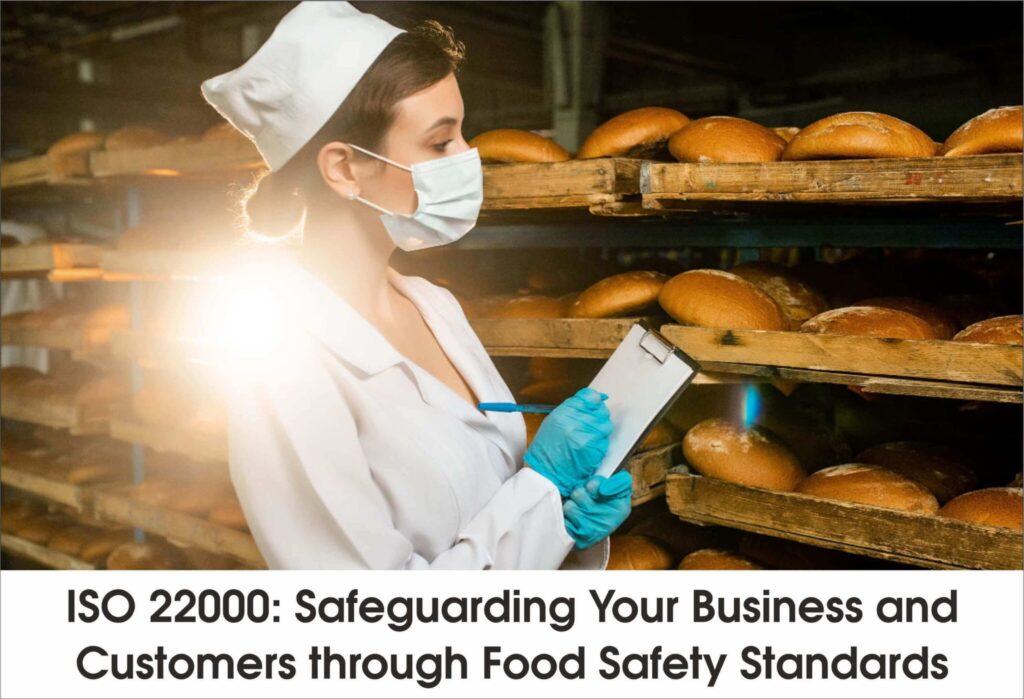ISO 22000: Safeguarding Your Business and Customers through Food Safety Standards

Understanding the Importance of Food Safety in a rapidly growing era. Food safety is very important in the modern society. Customers have become more prudent about the quality and safety of the food they eat as a result of growing health and wellness knowledge and concerns. Consequently, companies in the food sector have to emphasize food safety and follow strict guidelines. Organizations must adhere to strict food safety regulations to be certified by ISO 22000, a globally recognized standard for food safety management systems. Adherence to ISO 22000 standards not only signifies a dedication to delivering secure and superior products but also amplifies client confidence. Enforcing proper procedures at every stage of production—from collecting raw materials to handling, storing, processing, and distributing the completed product—is the goal of the standards and legislation that control the food industry. They also aim to prevent contamination and minimize health risks. By implementing stringent food safety protocols, businesses may safeguard both their brand and the health of their clientele. Today’s customers want responsibility and honesty from the businesses they do business with. In addition to creating trust, proving your dedication to food safety gives you a competitive advantage in a congested industry. What is ISO 22000 and How Does it Ensure Food Safety? The ISO 22000 standard defines the standards for a food safety management system. An ISO 22000-compliant FSMS provides food manufacturers with a systematic strategy and the required tools to control the safety of their goods and services. ISO 22000, as part of the FSMS, requires the establishment of effective communication with interested parties, the implementation of a risk-based approach, the establishment and maintenance of prerequisite programs, hazard control plans (OPRPs and CCPs), the monitoring of FSMS and food safety performance, and the seeking and realization of opportunities for continuous improvement. ISO 22000:2018 integrates and complements the core aspects of ISO 9001 and HACCP to offer an appropriate framework for establishing, implementing, monitoring, and continuously improving a documented Food Safety Management System (FSMS) within the context of an organization’s overall business risks. The Benefits of Implementing ISO 22000 in Your Business ⮯ Organizations that have a strong FSMS in place are better able to react quickly and effectively to problems that might jeopardize the safety of their food. By doing this, they may stop possible contamination and other food safety problems in their tracks. Additionally, the organization can react appropriately to unforeseen events due to the presence of emergency preparedness. Implementing an ISO 22000-compliant FSMS can also boost corporate performance. Organizations may limit the likelihood of product recalls by recognizing and controlling food safety issues, which can be costly and detrimental to a company’s brand. Furthermore, firms that demonstrate a commitment to food safety may be able to differentiate themselves from rivals and attract new customers who value food safety and quality. The standard promotes a methodical approach to discovering, analyzing, and addressing food safety issues. This enables companies to make educated decisions on how to avoid or reduce possible threats. ISO 22000 accreditation displays a dedication to food safety and quality. This can boost consumer trust in the organization’s products and services. ISO 22000 is a globally recognized standard, which implies that enterprises certified to this standard are more likely to be accepted by foreign clients and partners. The Future of Food Safety: Emerging Trends and Technologies As we all are aware the e-commerce sector is expanding rapidly and food safety has become a top priority. With the expansion of the e-commerce sector, food safety has become increasingly critical. It has become very tough to guarantee the safety and quality of the food supply due to the rise of direct-to-consumer platforms and online meal delivery services. An innovative idea with great promise to solve these problems is blockchain technology. Chains from farm to fork may be traced and made transparent with blockchain technology. This enables clients to have complete knowledge about the origin, handling, and transportation of the food products they buy. Delivering perishable commodities within acceptable limits is made possible by blockchain technology, which enables real-time temperature monitoring throughout transportation. Lessening health concerns, also makes it possible to quickly identify and recall tainted or compromised items. Blockchain technology can help businesses increase customer confidence in e-commerce food supply chains by bringing transparency and responsibility to the table. Knowing that the food goods they have purchased have passed thorough safety inspections at every stage of the process will give consumers peace of mind. Additionally, by expediting regulatory compliance procedures, this technology helps firms. Audits become less time-consuming and more effective when precise and unchangeable data are accessible on the blockchain. Conclusion ✅ In conclusion, understanding the importance of food safety is vital for businesses operating in the food industry. By adhering to industry standards such as ISO 22000 and complying with relevant regulations, companies can prioritize consumer well-being while fostering trust and loyalty among their customer base.
